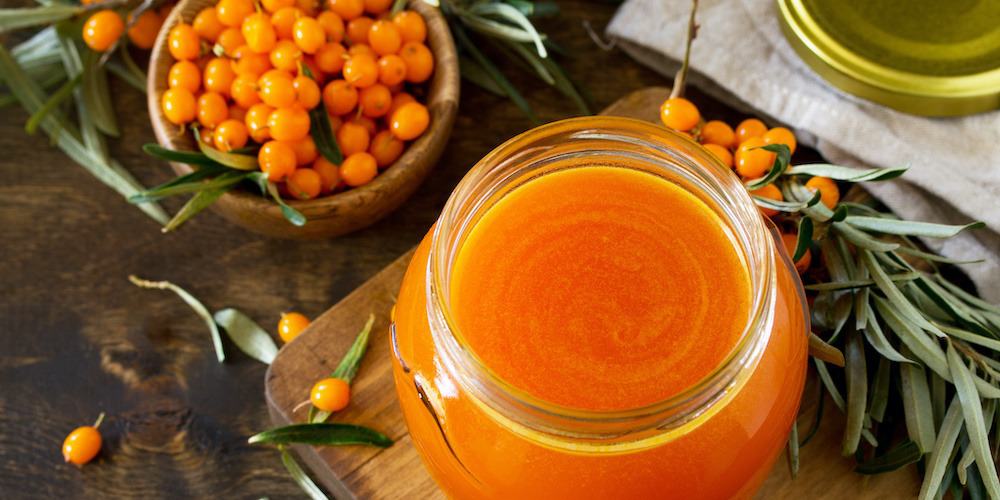BENEFITS OF SEA BUCKTHORN
✓ Fights fatigue
✓ Exhibits antioxidant activity
✓ Reduces inflammation
✓ Supports cardiovascular health
✓ Potentially anti-cancer
What is sea buckthorn?
Sea buckthorn, also known as “thorny willow” (Hippophae rhamnoides) is the main representative of the family Elaeagnaceae. This shrub can reach a height of up to 5 meters and grows in Europe and Asia, in temperate regions. However, due to its unique adaptability and acclimatization, it is also found at high altitudes in the Himalayas and Siberia, earning it the nickname “Siberian olive.”
It is often confused with another shrub: the strawberry tree (Arbutus unedo). Although their French names are similar, they do not share the same properties. Like rose hips, sea buckthorn has numerous thorns on its branches. After flowering in spring, it produces edible berries of yellow-orange color: seaberries. About the size of a large olive, they contain numerous seeds.
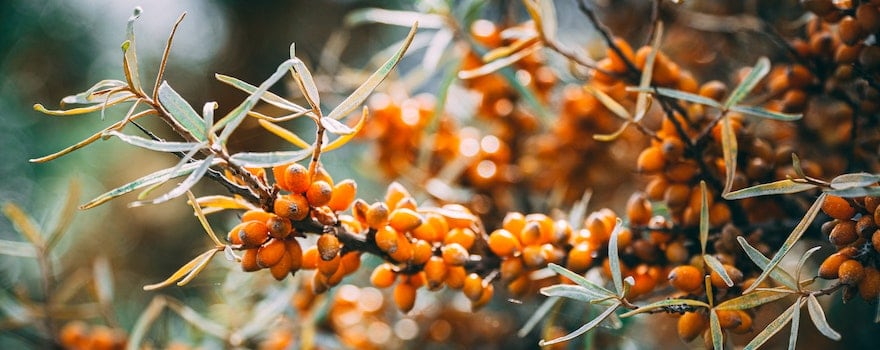
Sea buckthorn also has a dense, deep root system and long, narrow leaves. Its bark is a lovely brown-gray.
All parts of the shrub contain nutrients, offer health benefits, and are used in herbal medicine.
A traditional medicinal plant in Tibet, Mongolia, and China, sea buckthorn has been consumed there for centuries. It is indicated for the treatment of circulatory issues, heart disorders, and liver lesions.
Recent studies have highlighted its various beneficial actions on the body. It is now recognized for combating fatigue, protecting the body from free radicals, reducing inflammation, and supporting cardiovascular health. Sea buckthorn also has anti-cancer potential.
Nutritional Composition
- Amino Acids
- Vitamins: provitamin-A, B1, B2, C, E, F, K, P
- Minerals and Trace Elements: calcium, phosphorus, potassium, magnesium, iron, sodium, copper
- Proteins
- Lipids
- Antioxidant Actives: flavonoids, carotenoids, phenols, phytosterols, anthocyanins
- Fatty Acids: omega-3-6-7-9
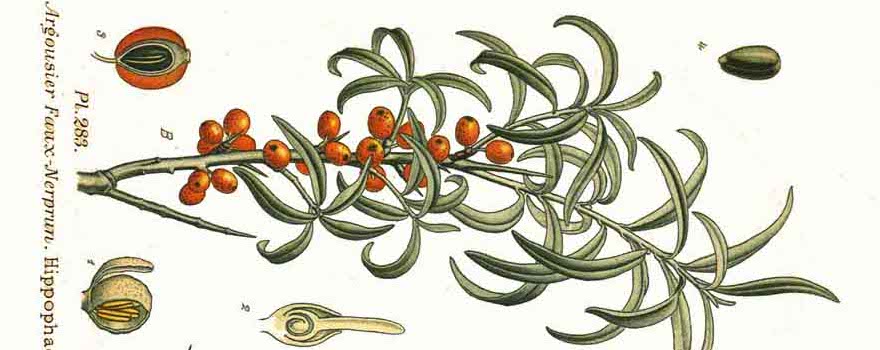
The Benefits of Sea Buckthorn
⚡️ Fights Fatigue
Sea buckthorn is a powerful natural tonic for the body. It helps combat temporary fatigue, provide vitality, and improve mood. Its vitamin C also strengthens the immune system and prevents many common winter ailments and infections: colds, flu… It’s a valuable ally for preventing energy slumps!
This action is due to its high content of vitamin C or ascorbic acid. With 250 to 300 mg per 100 g, sea buckthorn berries rank among the foods richest in vitamin C. They contain 5 times more than kiwi and 30 times more than orange!
But they also contain other anti-fatigue nutrients. Vitamins B1 and B2, for example, combat nervous fatigue. Magnesium and iron also help reduce exhaustion and contribute to the production of energy in the body.
This study by Jilin University (China), conducted on mice, shows the effectiveness of sea buckthorn berries in reducing fatigue.
🥝 Exhibits Antioxidant Activity
Thanks to its exceptional richness in vitamin C, sea buckthorn is also capable of fighting free radicals. These accelerate aging, weaken the body’s cells, and increase the risk of cardiovascular diseases and cancers.
The action of vitamin C is complemented by other nutrients found in the berries, such as vitamin E, flavonoids, carotenoids, phenols, phytosterols, and anthocyanins. Like watercress and nettles, sea buckthorn contains major phenolic compounds including kaempferol and quercetin. They exhibit scavenging activity and DNA protection against certain free radicals (hydroxyl radicals, superoxide anions, DPPH radicals).
Finally, it is one of the few foods that contain omega-3, 6, 7, and 9 fatty acids. They help protect cells against the action of free radicals.
This study from the Institute of Nuclear Medicine and Allied Sciences in Delhi (India), conducted directly on cells, demonstrates the antioxidant activity of sea buckthorn berries.
This other study from the same institute, also conducted on cells, concludes that sea buckthorn is a safe and effective antioxidant plant.
🌵 Reduces inflammation
In various studies, the consumption of sea buckthorn has been shown to reduce inflammation. It is effective on both skin inflammation and that of mucous membranes, intestines, and joints.
To do this, sea buckthorn acts on different elements involved in the inflammatory process. On one hand, it supports the transcription factor Nrf2, responsible for regulating the body’s inflammatory response. On the other hand, it inhibits the production of pro-inflammatory cytokines (interleukin-1ß and interleukin-6) which amplify inflammation.
Also read These natural and delicious anti-inflammatory foods
Isorhamnetin, one of the flavonoids in sea buckthorn, seems to be behind its action. Vitamin E also helps reduce cytokine levels. As for magnesium, it significantly lowers the level of C-reactive protein (CRP), a marker of inflammation.
This study from the Defense Institute of Physiology and Allied Sciences in Delhi (India), conducted on mice, shows the anti-inflammatory properties of sea buckthorn.
This other study from the Patanjali Research Institute (India), conducted on human cells, demonstrates the effectiveness of sea buckthorn in cases of skin inflammation.
❤️ Supports cardiovascular health
Consuming sea buckthorn is particularly interesting to protect the heart and prevent cardiovascular diseases like atherosclerosis. Indeed, it beneficially affects major risk factors such as hypercholesterolemia, hypertension, and hypertriglyceridemia.
In the heart, its antioxidants prevent the degradation of blood vessels caused by free radicals. Vitamin C improves blood circulation, maintains vessel elasticity, and prevents their narrowing.
To support cardiovascular health, you can also rely on its vitamin E, which aids in vasodilation, on vitamin K, which is involved in coagulation, or on its omega-3, 6, and 9 fatty acids.
The exceptional composition of sea buckthorn allows for a holistic action. Thus, it reduces blood pressure, decreases LDL-cholesterol or ‘bad cholesterol’ as well as triglyceride levels.
This study from the Institute of High Altitude Research Defense (India), conducted on rats, shows the effectiveness of sea buckthorn berries in reducing cardiovascular risk factors.
This other study from the Indian Institute of Medical Sciences (India), conducted on rats, shows how it effectively protects the heart.
🔬 Potentially anti-cancer
In various studies, sea buckthorn has shown anti-cancer potential. Indeed, it seems to significantly inhibit the proliferation of cancer cells and induce their apoptosis (programmed cell death).
At the same time, it stimulates the production of lymphocytes, improves the activity of macrophages and NK cells (‘natural killers’).
This study from Jilin University (China), conducted on mice, shows the anticancer and immunostimulant activities of sea buckthorn.
This other study from Al-Farabi Kazakh National University (Kazakhstan), conducted on cancer cells, shows how sea buckthorn prevents their proliferation.

How to consume sea buckthorn?
Sea buckthorn berries
Sea buckthorn berries have a naturally sweet and slightly tangy taste. They are harvested in the summer and can be eaten as they are. But it’s also possible to dry them. You can then eat them plain, mix them with yogurt, muesli, or cereals, prepare them as an infusion, or incorporate them into dishes and desserts.
Once pressed, the fresh berries are also used to prepare the famous sea buckthorn juice. It can be drunk pure or diluted in water, with added sugar, honey, or lucuma powder to soften its bitter flavor.
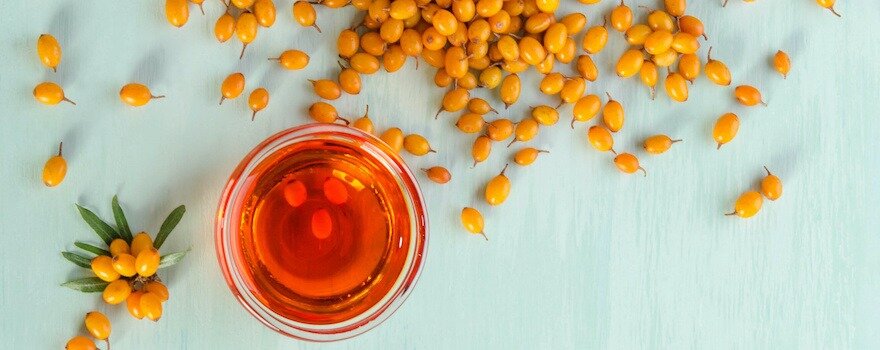
Sea buckthorn in tablets
Sea buckthorn capsules and tablets are made from dried berries ground into powder. It is an easy-to-find and convenient to take format. It will suit those who do not appreciate the taste of the berries.
Choose capsules sufficiently dosed in sea buckthorn (300 mg/capsule minimum), preferably without additives and plant-based.
Sea buckthorn powder
Sea buckthorn powder is obtained by pressing dried berries. It is a natural dietary supplement, generally minimally processed and contains a large amount of nutrients.
It can be consumed in various ways: mixed in a drink, sprinkled on cereals or in yogurt… It will also bring a tangy flavor to your homemade preparations (breads, desserts, pastries…).
Choose a powder obtained by cold pressing, 100% pure, without additives, preservatives, or GMOs.
Sea buckthorn vegetable oil
Pressing the seeds contained in sea buckthorn berries results in a precious vegetable oil. Due to its high content of vitamin E, carotenoids, antioxidants, and fatty acids, it is ideal for the skin.
Sea buckthorn oil is anti-aging, regenerative, soothing and provides a “healthy glow” effect. You can apply it directly to your skin, incorporate it into your homemade cosmetic recipes, or add a few drops to your daily care products.
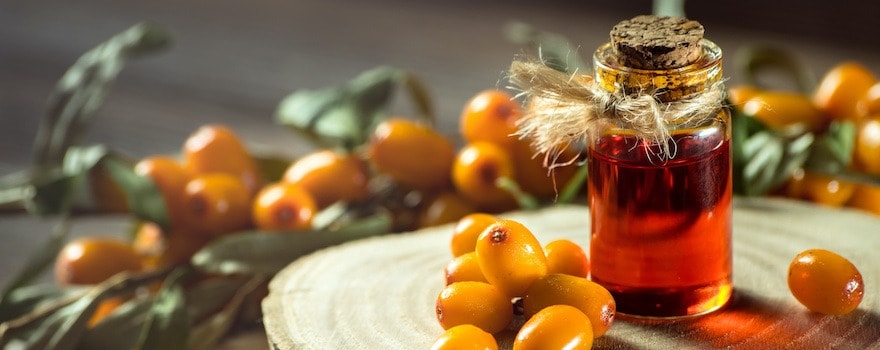
Sea buckthorn in mother tincture
Sea buckthorn mother tincture comes from the maceration of berries in a water and alcohol mixture. Particularly rich in active compounds, this format, however, contains a large amount of alcohol. It is therefore not recommended for pregnant women, children, or people with certain conditions.
Sea buckthorn and medicinal plants
To strengthen the body and fight fatigue, sea buckthorn can be combined with other superfoods rich in vitamins like acerola or camu camu.
To reduce inflammation, you can pair sea buckthorn with natural anti-inflammatory foods: turmeric, ginger, moringa… Finally, to protect the cardiovascular system, you can complement your sea buckthorn intake with Brazil nuts, basil seeds, or hemp.
Sustainable consumption: prioritize local, organic, and fair-trade sea buckthorn
✓ In France, sea buckthorn berries are harvested in coastal regions, like the Baie de Somme, or in the mountains, mainly in the Alps. If you are lucky enough to pick them in the wild, choose the right moment. Sea buckthorns are very delicate fruits that become soft and crush easily. The harvest usually begins in early August and continues through September. Remember to wear gloves as sea buckthorn is full of thorns!
✓ If wild picking is not possible, you can buy dried sea buckthorn berries. Preferably choose berries harvested in France and certified organic. Some are also fair-trade certified.
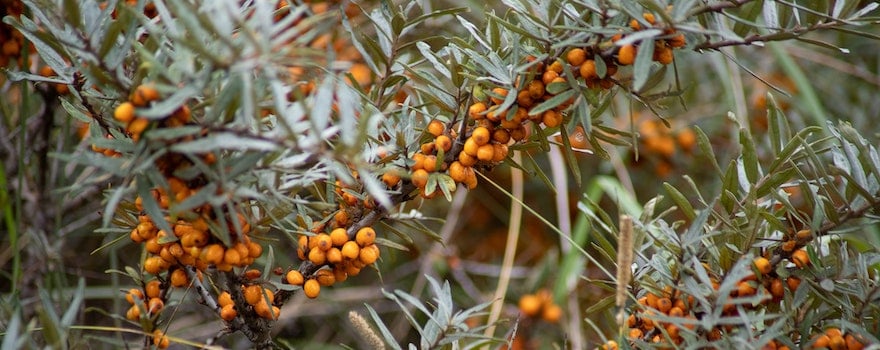
Dosage
There is really no recommended dosage for sea buckthorn. Simply ensure not to consume it in excess.
The capsules should be taken with a large glass of water and before meals. Due to its high vitamin C content, avoid consuming sea buckthorn at the end of the day.
A 3-week regimen is ideal before winter or in spring, complemented by a regimen of birch sap.
🍒 Sea buckthorn berries: 4 g per day
🥃 Juice: 70 ml per day
💊 Tablets: 3 to 5 capsules per day for 300 mg capsules
🥄 Powder: 2 to 4 g per day
🍯 Vegetable oil: 1 to 2 external applications per day
🧪 Mother tincture: 15 drops morning and evening
Contraindications and side effects
Consumption of sea buckthorn presents certain contraindications:
- As a precaution, sea buckthorn is not recommended for pregnant or breastfeeding women and young children;
- Due to its effect on blood circulation, people suffering from a bleeding disorder or about to undergo surgery should avoid consuming it;
- It is not recommended for people suffering from low blood pressure.
Its consumption presents very few adverse effects. Only mild digestive disorders are possible. If you experience side effects, stop your consumption and consult a doctor.
History, culture, and market of sea buckthorn
Sea buckthorn is a plant known for centuries. In Europe, as well as in Tibet, Mongolia, and Russia, the plant is used for numerous purposes: preparation of drinks and alcoholic beverages, production of food or medicinal products… In France, the recent archaeological discovery by INRAP (National Institute of Preventive Archaeological Research) shows that sea buckthorn has been cultivated since Antiquity.
But sea buckthorn is not only useful to humans. It is highly appreciated by birds for its sweet berries, and its flowers attract pollinating insects. Its rapid growth and adaptability are interesting for reforestation projects, combating desertification and soil erosion. Like legumes, sea buckthorn can enrich the soil by fixing nitrogen. Thus, it is a favored tree in permaculture.
Sources and scientific studies
Rui Li, Qing Wang, Menghao Zhao, Peiming Yang, Xiao Hu, Danwei Ouyang, 2019. Flavonoid glycosides from seeds of Hippophae rhamnoides subsp. Sinensis with α-glucosidase inhibition activity.
Weihua Ni, Tingting Gao, Hailiang Wang, Yuzhi Du, Jiayu Li, Cen Li, Lixin Wei, Hongtao Bi, 2013. Anti-fatigue activity of polysaccharides from the fruits of four Tibetan plateau indigenous medicinal plants.
Sandeep Kumar Shukla, Pankaj Chaudhary, Indracanti Prem Kumar, Namita Samanta, Farhat Afrin, Manju Lata Gupta, Upendra Kumar Sharma, Arun Kumar Sinha, Yogendra Kumar Sharma, Rakesh Kumar Sharma, 2006. Protection from radiation-induced mitochondrial and genomic DNA damage by an extract of Hippophae rhamnoides.
Raman Chawla, Rajesh Arora, Shikha Singh, Ravinder Kumar Sagar, Rakesh Kumar Sharma, Raj Kumar, Ashok Sharma, Manju L Gupta, Surender Singh, Jagdish Prasad, Haider A Khan, Anand Swaroop, A K Sinha, A K Gupta, Rajender P Tripathi, P S Ahuja, 2007. Radioprotective and antioxidant activity of fractionated extracts of berries of Hippophae rhamnoides.
Himanshi Tanwar, Shweta, Divya Singh, Shashi Bala Singh, Lilly Ganju, 2018. Anti-inflammatory activity of the functional groups present in Hippophae rhamnoides (Seabuckthorn) leaf extract.
Acharya Balkrishna, Sachin Shridhar Sakat, Kheemraj Joshi, Kamal Joshi, Vinay Sharma, Ravikant Ranjan, Kunal Bhattacharya, Anurag Varshney, 2019. Cytokines Driven Anti-Inflammatory and Anti-Psoriasis Like Efficacies of Nutraceutical Sea Buckthorn (Hippophae rhamnoides) Oil.
Vivek Vashishtha, Kalpana Barhwal, Ashish Kumar, Sunil Kumar Hota, Om Prakash Chaurasia, Bhuvnesh Kumar, 2017. Effect of seabuckthorn seed oil in reducing cardiovascular risk factors: A longitudinal controlled trial on hypertensive subjects.
Salma Malik, Sameer Goyal, Shreesh Kumar Ojha, Saurabh Bharti, Saroj Nepali, Santosh Kumari, Virendra Singh, Dharamvir Singh Arya, 2011. Seabuckthorn attenuates cardiac dysfunction and oxidative stress in isoproterenol-induced cardiotoxicity in rats.
Hailiang Wang, Tingting Gao, Yuzhi Du, Hongxia Yang, Lixin Wei, Hongtao Bi, Weihua Ni, 2015. Anticancer and immunostimulating activities of a novel homogalacturonan from Hippophae rhamnoides L. berry.
G T Zhamanbaeva, M K Murzakhmetova, S T Tuleukhanov, M P Danilenko, 2014. Antitumor activity of ethanol extract from Hippophae rhamnoides L. leaves towards human acute myeloid leukemia cells in vitro.


